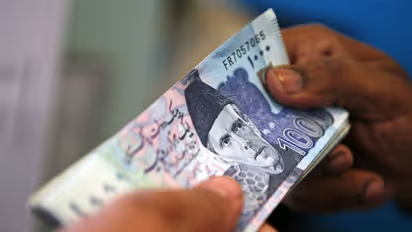Pakistani rupee plummets to record low as IMF bailout urgency grows

Synopsis
Pakistan's currency fell to a record low of Rs 255 against the US dollar on Thursday, according to local media reports. The tumble comes after the cash-strapped government relaxed its grip on the exchange rate to win much-needed loans from the International Monetary Fund (IMF).
In a fall that could convince the International Monetary Fund to restart funding to the country, the Pakistani rupee dropped 9.6% versus the dollar on Thursday, according to figures from the central bank. This is the greatest one-day decrease in more than two decades.
The decline follows the removal of an exchange rate cap by foreign exchange corporations, which was a crucial demand of the IMF as part of a package of economic reforms it had agreed upon with the cash-strapped South Asian nation.
According to the central bank, the currency's official value against the dollar ended the day at 255.4 rupees, up from 230.9 on Wednesday.
Also Read | US special forces kill senior Islamic State official, 10 other terrorists in Somalia
Pakistan is in critical need of external finance as a result of its severe balance of payments problem. Its foreign exchange reserves, which only have enough money to cover less than three weeks' worth of imports, dropped by $923 million to $3.68 billion in the most recent figures.
In 2019, Pakistan received a $6 billion IMF bailout. A further $1 billion was added to it last year to assist the nation in recovering from disastrous floods, but the IMF subsequently halted payments in November as a result of Pakistan's inability to make further progress with fiscal restructuring.
Also Read | Chris Hipkins sworn in as New Zealand's new Prime Minister; promises to fight 'pandemic of inflation'
On Thursday, the lender said that it will send a team to the nation at the end of January to talk about restarting the programme. The IMF emphasised in its statement on Thursday that it is pushing for the government to go to a market-determined exchange rate system in addition to wanting it to implement budgetary reforms.
However, the Pakistan Stock Exchange responded favourably to the rupee's decline, as seen by the KSE 100 index's explosive gain of more than 1,000 points, or 2.5%.
While the decision raises the likelihood that IMF money would resume, Pakistan is already suffering from decades-high inflation, which experts worry will further worsen as a result of the decision. Fuel and the majority of Pakistan's other essential imports are mostly paid for in dollars.
Also Read | UK’s Crown Estate sues Twitter over alleged outstanding rent for London offices
Check the Breaking News Today and Latest News from across India and around the world. Stay updated with the latest World News and global developments from politics to economy and current affairs. Get in-depth coverage of China News, Europe News, Pakistan News, and South Asia News, along with top headlines from the UK and US. Follow expert analysis, international trends, and breaking updates from around the globe. Download the Asianet News Official App from the Android Play Store and iPhone App Store for accurate and timely news updates anytime, anywhere.